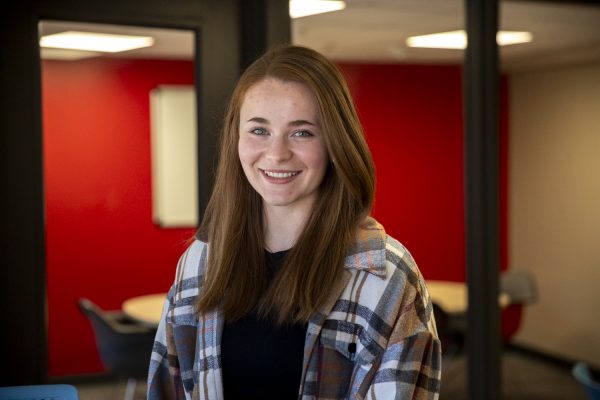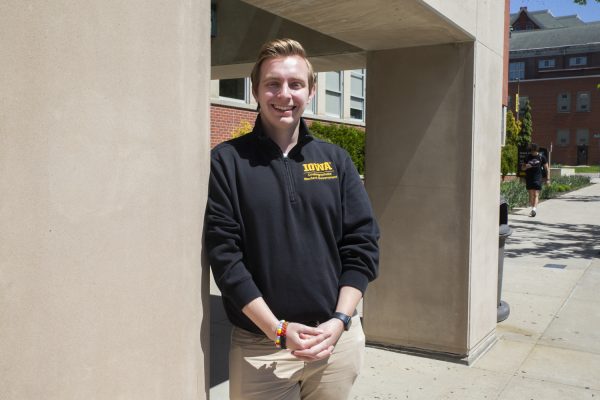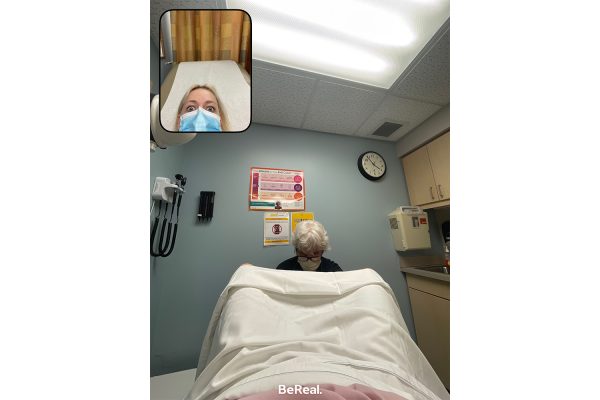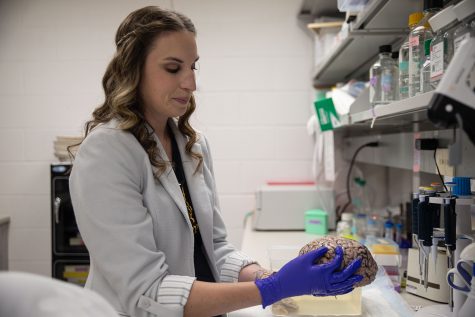UI Senior Ben Stone creates software to aid student Iowa literacy programs
University of Iowa fourth-year student Ben Stone designs applications that help the Iowa Reading Research Center collect data to evaluate the success of K-12 classroom interventions.
University of Iowa student Ben Stone poses for a portrait inside of a research center in the Belin Blank Honors Center on May 5, 2022.
May 5, 2022
University of Iowa fourth-year student Ben Stone has gone far beyond the typical responsibilities of an undergraduate employee at the Iowa Reading Research Center.
Stone is the lead computer programmer at the center, a role not usually held by undergraduates. He created an application that collects data to evaluate interventions meant to improve literacy in K-12 Iowa classrooms.
The mission of the Iowa Reading Research Center is to facilitate literacy proficiency in pre-K-12 classrooms primarily in Iowa.
The center currently uses Stone’s application to evaluate the results of a reading intervention in four middle schools in Iowa. Additionally, the center evaluates the results of interventions in three other Iowa school districts and in three juvenile justice facilities in Georgia.
Stone’s work has been to make collecting reading and writing test results more efficient so that the center can determine if the schools it partners with follow the center’s learning programs and have improved student literacy as a result.
“The applications that we create are generally tools and things that assist in the research collection that the center does,” Stone said. “As the lead, I also work directly with project managers and directors to take application ideas, project ideas, and requirements that they need.”
Stone, who began his work at the Iowa Reading Research Center in July 2020, said his fluency and writing application make automatic calculations and aggregations, which were previously done by hand.
The application not only collects data on student reading and writing success but on teachers’ adherence to the classroom interventions.
“How faithful are the teachers to these new interventions and is that what’s actually helping?” he said. “And that can be used both for the research but also to show how effective things that the research center is coming up with are in actually impacting student classrooms.”
Deborah Reed, the director of the Iowa Reading Research Center, likened Stone to a professional staff member, which is not an expectation she generally holds for undergraduate employees.
“Ben knew what to do, and with just some description of what we were trying to create and accomplish, he started building it,” Reed said. He met with us to iteratively develop and refine the system, and he has continued to make improvements on it.”
Reed said that in addition to assigning him programming projects, her team allowed Stone to supervise other undergraduates and train external partners on how to use his system, which an undergraduate has never done until now.
“He conducts himself in ways that are extremely professional,” she said. “He’s very calm and understands the iterative development process, so he never gets upset when we ask for changes.”
Sean Thompson, Iowa Reading Research Center communications specialist, remembers being on the small committee that hired Stone in July 2020.
“I can tell that it’s meaningful to him, not only because he’s a talented computer programmer, but because the mission of what we do here is important to him as well,” Thompson said.
Stone said part of his passion for this project grew from memories of his own experience learning to read. Today, he reads novels voraciously.
“What stood out to me about the center and why I wanted to apply when I first saw the opportunity is I actually struggled reading when I was younger,” Stone said. “I think if there’s anything that can come out of these applications it would be to collect the data that could actually help improve literacy.”















